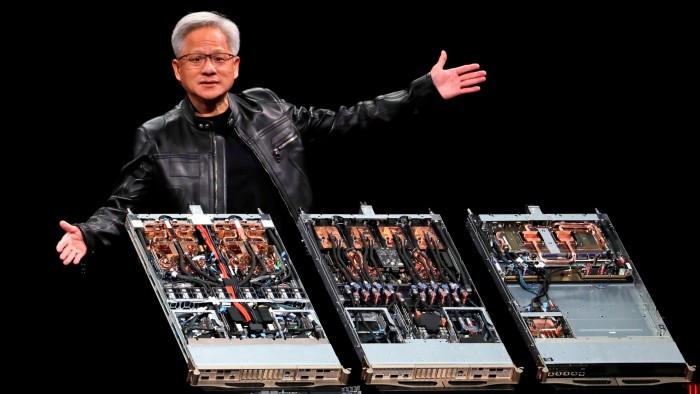Unlock the Editor’s Digest for free
Roula Khalaf, Editor of the FT, selects her favourite stories in this weekly newsletter.
For over a decade, the US has been waging its chip cold war with a familiar arsenal. Blacklists, export controls and extraterritorial rules — all staples of Washington’s well-worn playbook — were meant to deny China access to critical technologies and stall the ascent of its tech capabilities. The stall never came.
In response, restrictions have grown increasingly severe. The US government is now weighing additional restrictions on China, including revoking waivers that allow global chipmakers to access US technology in their China-based operations, according to a report in the Wall Street Journal.
China, meanwhile, has continued to advance. Local tech giant Huawei weathered US blacklisting in 2019. SMIC, China’s largest chipmaker, continued production despite sanctions and in 2022, surprised the industry by making chips using advanced 7 nanometre technology. The leap from 14 nanometres took just two years, according to consultancy TechInsights, faster than Taiwan Semiconductor Manufacturing Company and Samsung.
Most striking is Huawei’s latest AI chip, the Ascend 910C, produced by SMIC. The chip has begun displacing Nvidia’s products in China, with Nvidia’s local market share down to 50 per cent from 95 per cent. Nvidia chief executive Jensen Huang has called US export controls on China a failure, costing US companies billions of dollars in lost sales.
Yet while US policy continues to dominate headlines, the most structurally significant move in the chip war will not come from Washington, but from Taipei. Taiwan has blacklisted China’s leading tech groups Huawei and SMIC, among a total of 601 foreign entities added to its strategic high tech entity list. Taiwanese companies must, under existing regulations, obtain licenses before shipping products to any newly listed entity.
This marks a drastic departure from Taiwan’s historic approach. For years, it maintained a careful balance, supplying the world with chips — it produces more than 90 per cent of the world’s most advanced chips through TSMC — while avoiding direct confrontation with China. Part of its restraint was out of economic necessity. China was, and remains, Taiwan’s largest trading partner. About a third of Taiwan’s $152.7bn chip output goes to China and Hong Kong.
The other part was strategic caution. Taiwan has long walked a diplomatic tightrope. Direct confrontation with China, especially through unilateral sanctions, risked provoking economic or military retaliation. But as China’s military pressure on Taiwan intensifies and starts to fuse its tech sector more tightly with state power, Taipei’s strategy is shifting.
Taiwan’s new entity list will not immediately disrupt Chinese businesses. Many Taiwanese companies have local subsidiaries in mainland China and beyond Taipei’s jurisdiction. It also does not undo existing contracts. But its significance lies in what it enables going forward. Taiwan’s move carries unique weight because it sits at the centre of the chip supply chain. Unlike the US, Taiwan does not need to persuade other countries to comply because it has direct control over the companies that supply China’s chip inputs.
The timing is particularly delicate for China. While Huawei’s AI chips are seen as rivals to Nvidia’s, that progress is far more fragile than it appears. Huawei’s latest MateBook Fold computer, for example, runs on a chip made using SMIC’s 7 nanometre technology, according to TechInsights. That was once a milestone for China’s domestic chipmaking, but the chip is now three generations behind the 2 nanometre process that TSMC is expected to begin mass producing later this year.
Until now, that level of technology had been enough to keep China competitive despite sanctions. Beijing could compensate by deploying far greater volumes of older chips, backed by cheap energy and brute force scaling of production. But that workaround is losing traction as more advanced chips become the norm in the unsanctioned world.
The lag is widening and may soon become too wide to close without access to Taiwan’s chip infrastructure and critical inputs. More than just the technical barriers, it is the broader chipmaking ecosystem Taiwan has built over more than four decades that cannot be replicated.
The difference between the US and Taiwan is that the US can restrict, but Taiwan can halt. When the world’s most dangerous chokepoint in chip supply is no longer passive, it holds the power to redefine the global technological hierarchy.




